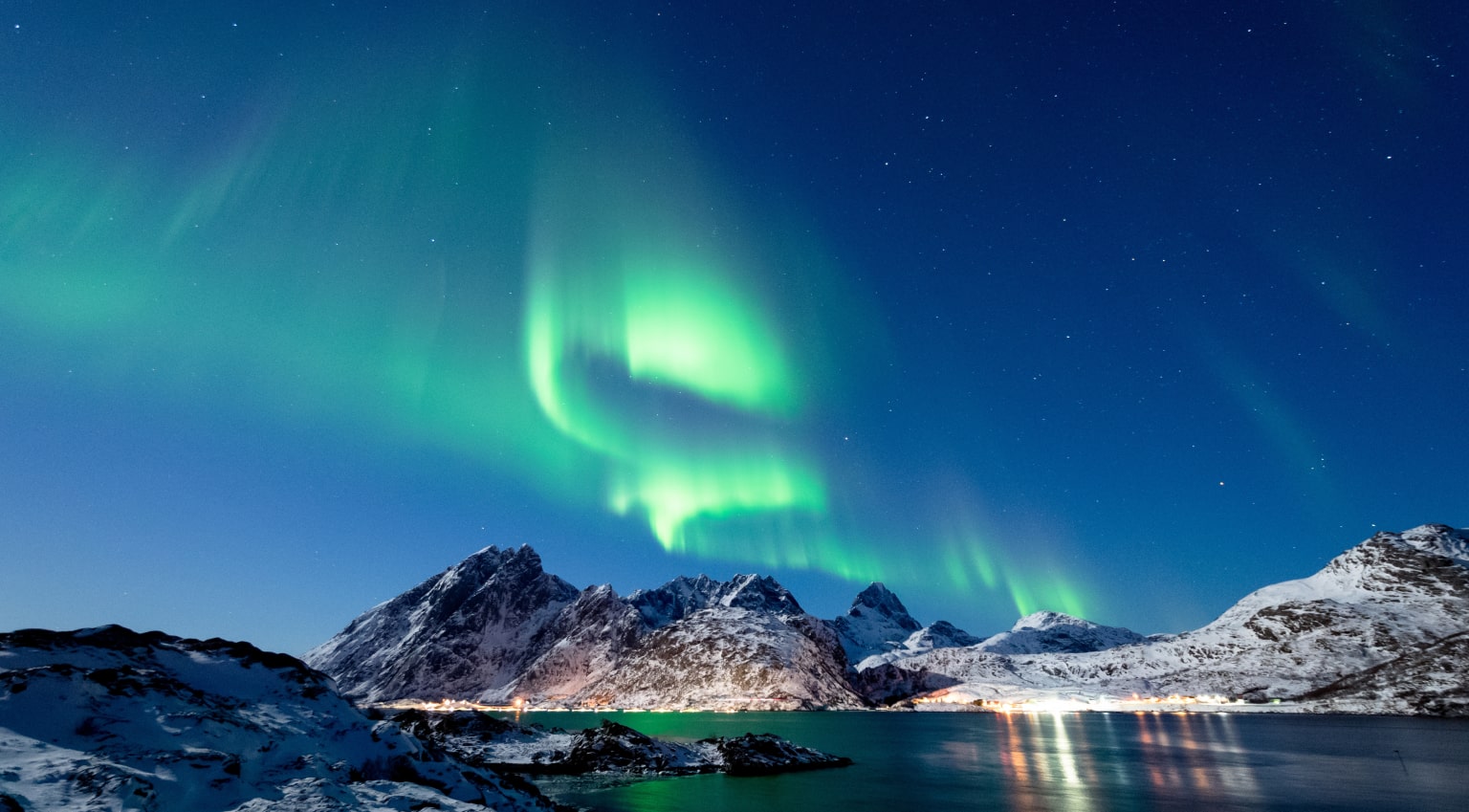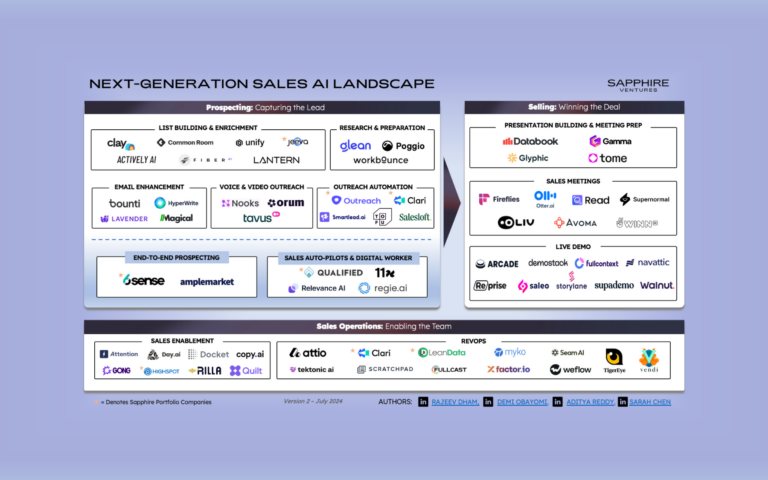If you were playing “startup word association” and someone said “the Nordics,” you wouldn’t be short of high-profile tech success stories to choose from: Spotify, Slush, Kahoot!, Zendesk, Supercell and Klarna, the list goes on. The Nordics — Sweden, Norway, Denmark, Finland and Iceland — are home to nearly 80 unicorns, including some of the most illustrious startups of the 21st century.
Over the years, each country has developed a distinct reputation. Sweden is famed for fintech, Denmark for B2B SaaS and Finland for gaming, while Norway and Iceland are earlier in their respective innovation journeys. Today, we’re unpacking the Nordic startup ecosystem and sharing why we’re excited to be investing in the region.
From Viking Dominance to Unicorn Factory
Nordic startups raised $11.7 billion in 2022. While, as in the majority of countries, funding fell compared to 2021, early-stage funding was relatively protected. Pre-seed to Series A funding levels remained relatively flat in 2022 and even grew in smaller ecosystems such as Iceland, which saw a 53% increase.
In fact, nine new unicorns were crowned in 2022: Byredo, Cint, Dune Analytics, einride, instabox, Oura, Polarium, Relex, and reMarkable.
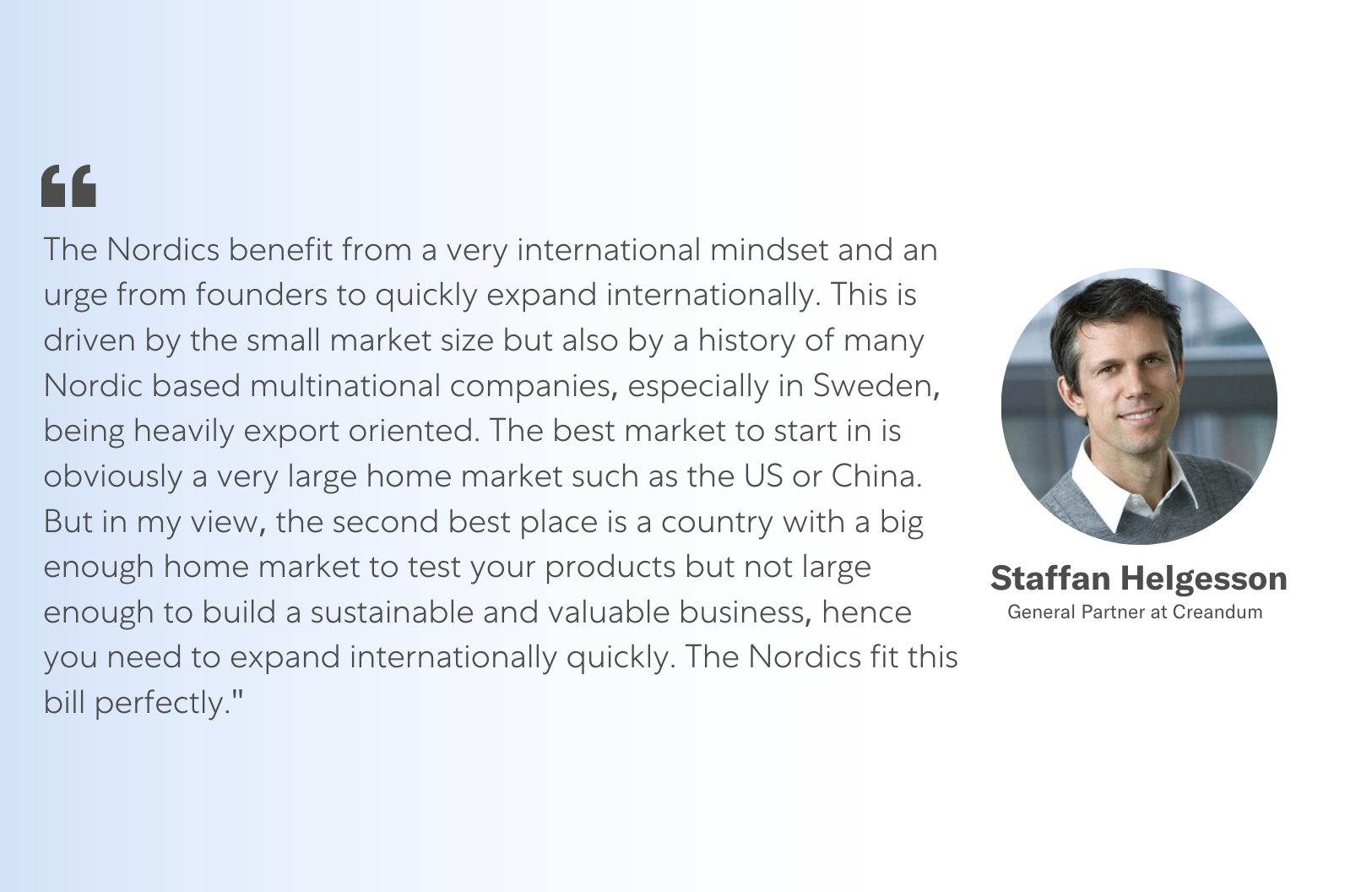
Leading the Charge: Impact and Sustainability
Before diving into a country by country breakdown, an area that deserves an explicit mention when we talk about the Nordics as a whole, is sustainability. The Nordic ecosystem has established itself as an emerging leader in this field. Companies leading the charge include H2 Green Steel, Lightyear, Monta, Northvolt and Normative. Impact investing accounted for about 25% of all venture capital investments in the region in 2021 and the first half of 2022. Additionally, Finland, Sweden, and Denmark were the top three performing countries in the 2022 SDG Index, a report that assesses the progress of United Nations member states toward sustainable development goals.
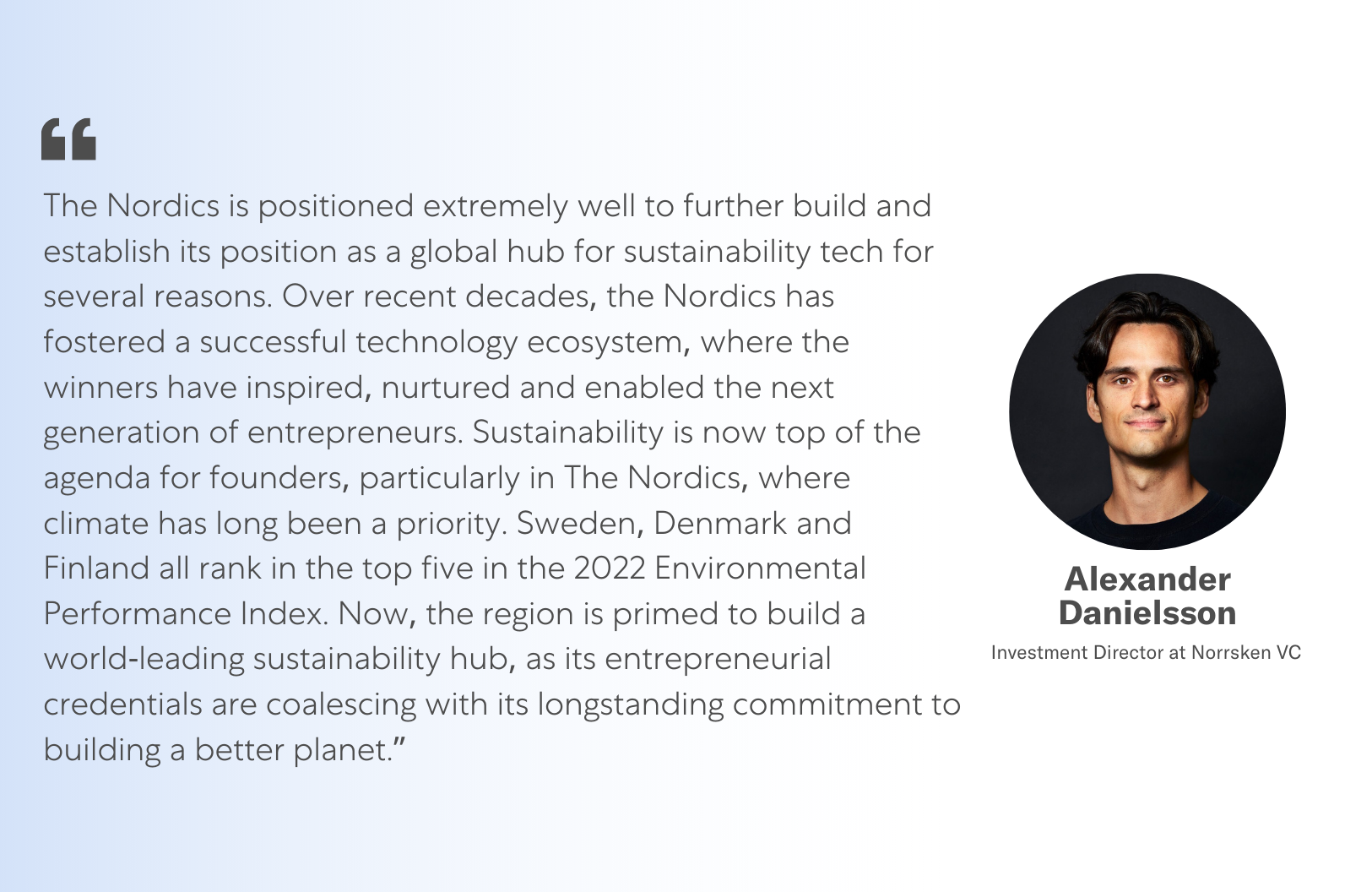
At Sapphire, we believe the Nordics are well-positioned to continue to dominate innovation around sustainability. The region, specifically Sweden and Norway, benefits from an abundance of cheap, renewable energy, primarily in the form of hydropower. This structural advantage has often enabled companies to embark on energy-intensive projects that would be non-starters in other geographies due to energy or infrastructure costs.
Furthermore, many Nordic investors have long focused on evaluating investment opportunities based on both impact and financial returns. It’s notable that 90% of the largest Nordic Private Equity firms publish transparency or climate-change reports, compared to 40% of their largest global peers. The Nordics also have a long tradition of public-private collaboration and public-sector incentives around topics such as green transformation and decarbonisation. Finally, Nordic companies are leaders in sustainability research, topping global rankings on R&D investments as a share of GDP.
So what role has each individual country played in creating the Unicorn factory better known as the Nordics?
Sweden: Where Founders Have Superstar Status
Over the last 20 years, Sweden has transformed itself from being synonymous with IKEA, Volvo and Ericsson to one of the leading European startup ecosystems, home to over half of the Nordic’s unicorns. We don’t believe this happened by chance. Rather, it was driven by a well-structured welfare state, favourable policies and an internationally focused mindset. Another factor has been the unicorn flywheel effect, in which second-time founders and early employees start or fund companies on significant growth trajectories. One of Sweden’s notable “mafias” is the Stardoll mafia, which includes Spotify founder Daniel Ek; Spotify CTO Andreas Ehn; Johannes Schildt, CEO and founder of Kry; and Henrik Torstensson, founder of Lifesum.
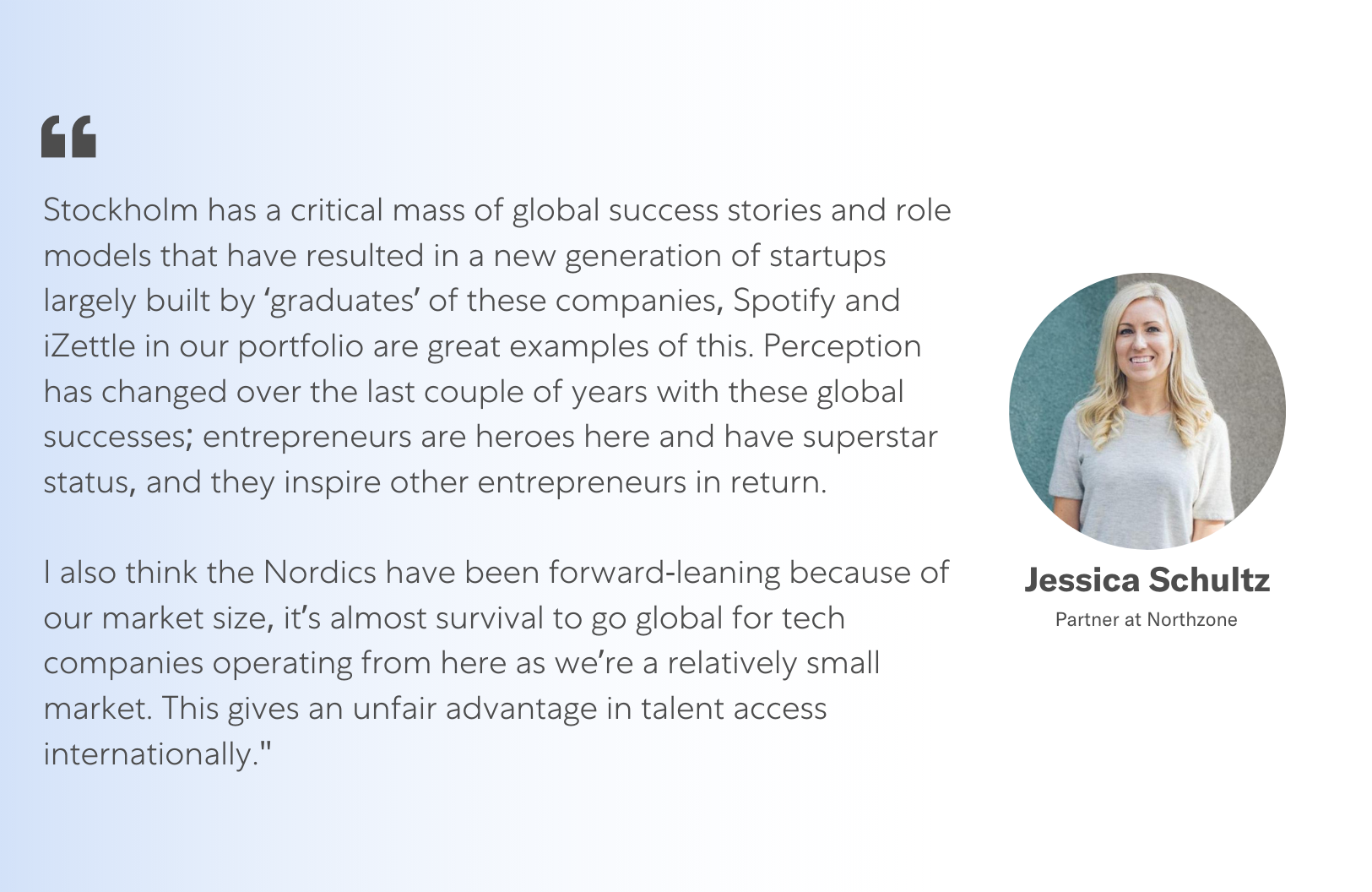
We view Sweden as currently going through its third wave of founders demonstrating an inverse bell-curve distribution of startups from pre-seed to IPO. At Sapphire, we see the most exciting companies in this ecosystem building at the Seed to Series A stage and a slight dearth of companies in the middle, illustrating the wave.
Some of the Swedish companies that excite us most include:
- Bits.bi, which is streamlining identity management for fintech companies with a no-code orchestration platform, enabling users to design dynamic onboarding flows and customer monitoring solutions.
- Grafbase enables developers to build GraphQL backends declaratively using a schema-first approach, allowing developers to focus on shipping products rather than building complex infrastructure.
- Insurely provides open insurance solutions. They enable customers to share their insurance data with insurance providers and banks, and in doing so these insurance providers and banks are able to deliver more transparent customer experiences to drive increased policy engagement, higher conversion and better data insights for customers.
- Planhat has built a horizontal customer success platform which allows organisations to unify customer data, set goals and ideal outcomes, and enhance the customer journey with features such as playbooks, automation and collaboration.
Denmark: The Home of B2B SaaS
Denmark is hot on the heels of Sweden, boasting an impressive unicorn club of its own JustEat, Pleo, Trustpilot, Unity, Zendesk, to name a few. The ecosystem has evolved rapidly over the past few years. Firstly, it saw the growth of a more cohesive ecosystem of investors from the early stages to exit and secondly the influx of international investors who made a record number of investments in Danish companies in recent years.
Denmark, in particular, benefits from a strong talent pool. It is home to Universities such as Copenhagen Business School, the IT University of Copenhagen, and Aalborg University, which was named Europe’s best engineering school for the past five years. Moreover, the startup bug has started to spread beyond Copenhagen, with cities such as Aarhus and Odense emerging as thriving cities for innovation.
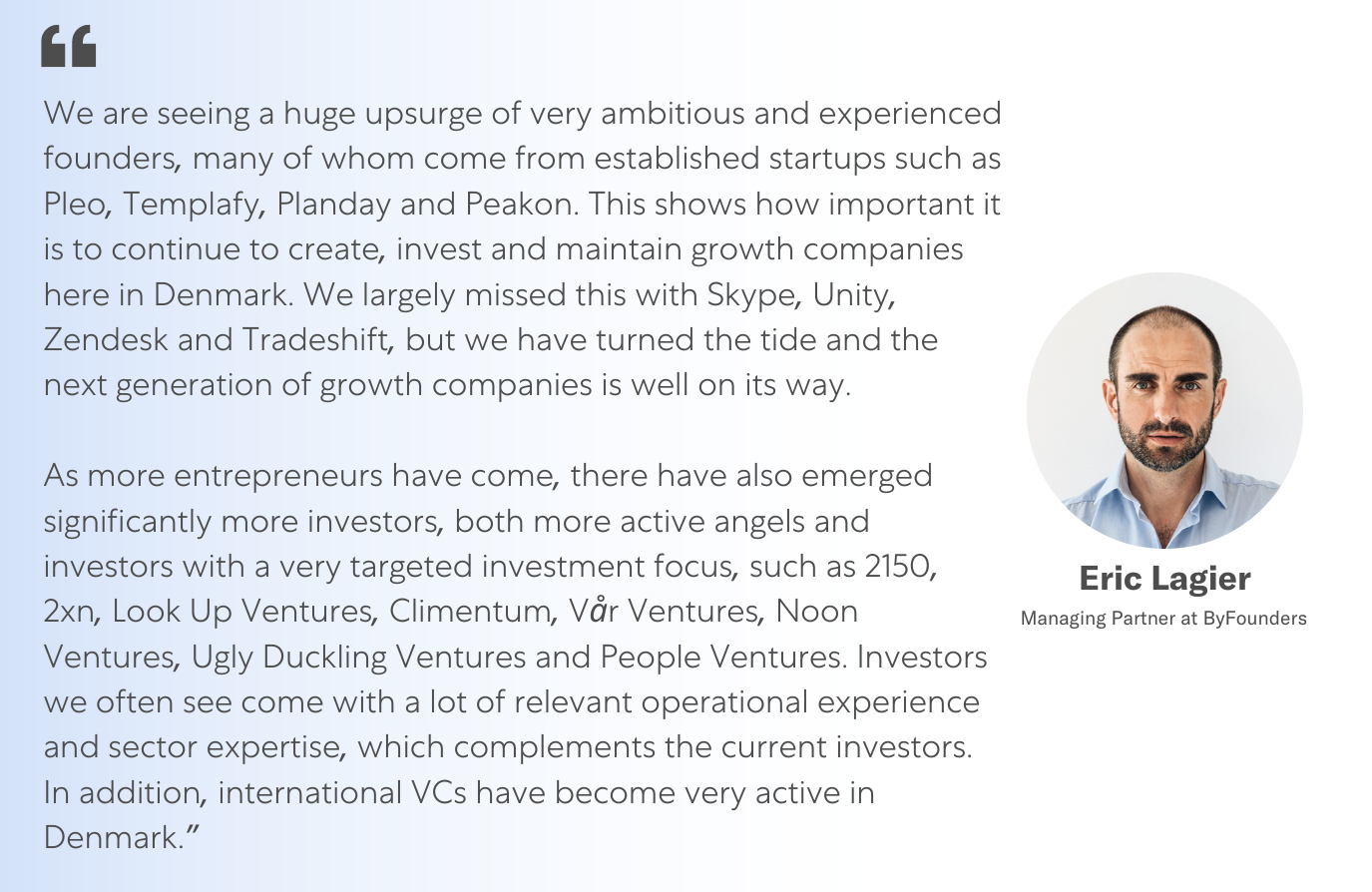
At Sapphire, what excites us most about Denmark is the emergence of an increasingly sizeable cohort of startups building within B2B SaaS. Many of the early pioneers here, such as Tradeshift, Unity, and Zendesk relocated their headquarters to the U.S. By acting as role models and providing Danes with a network of successful B2B founders, over the longer term this has helped create a new breed of commercial talent in Denmark and inspired others to build B2B propositions. These founders and early employees are, in turn, reinvesting in and building high-growth B2B startups in Denmark based on the know-how of those early success stories.
Exciting startups in Denmark include:
- CreativeForce have built a SaaS workflow platform for eCommerce content creation, including sample management, production DAM, workflow automation and review/approval workflows.
- Fullview provides an end-to-end platform for technical customer support with features such as co-browsing, session replays and console data troubleshooting.
- Medusa is an open-source e-commerce tool for JavaScript developers enabling merchants to adopt a “headless” stack and connect to third-party tools, including payment providers, logistics tools and customer management systems.
- Pento, whose automated payroll software enables businesses to automate everything from salary calculations to HMRC payments.
Finland: A Slush-Driven Talent Factory
Home to Europe’s leading startup conference, Slush, Finland proves that a lack of daylight for half the year is no hindrance to innovation. Both from its rise and fall, Nokia played a key role in this and specifically the creation of the Finnish startup ecosystem with many former Nokia employees going on to start their own tech businesses and startup-related endeavours. Finland is now at a point where a number of repeat entrepreneurs and early unicorn employees from the likes of Aiven, Supercell, Swappie and Wolt, are building high-growth startups and reinvesting in the ecosystem, driving flywheel effects.
Alongside this, three other core drivers for the increasing strength of the ecosystem are the establishment of several domestic VC funds such as Maki.vc, Icebreaker and Inventure focused on investing in the region, the strong international nature of Finland’s talent pool and the influx of international VCs who can plug the later stage historic funding gap. The Finnish startup ecosystem today is notably international. In 2022, 53% of VC investment in Finnish startups came from outside Europe.
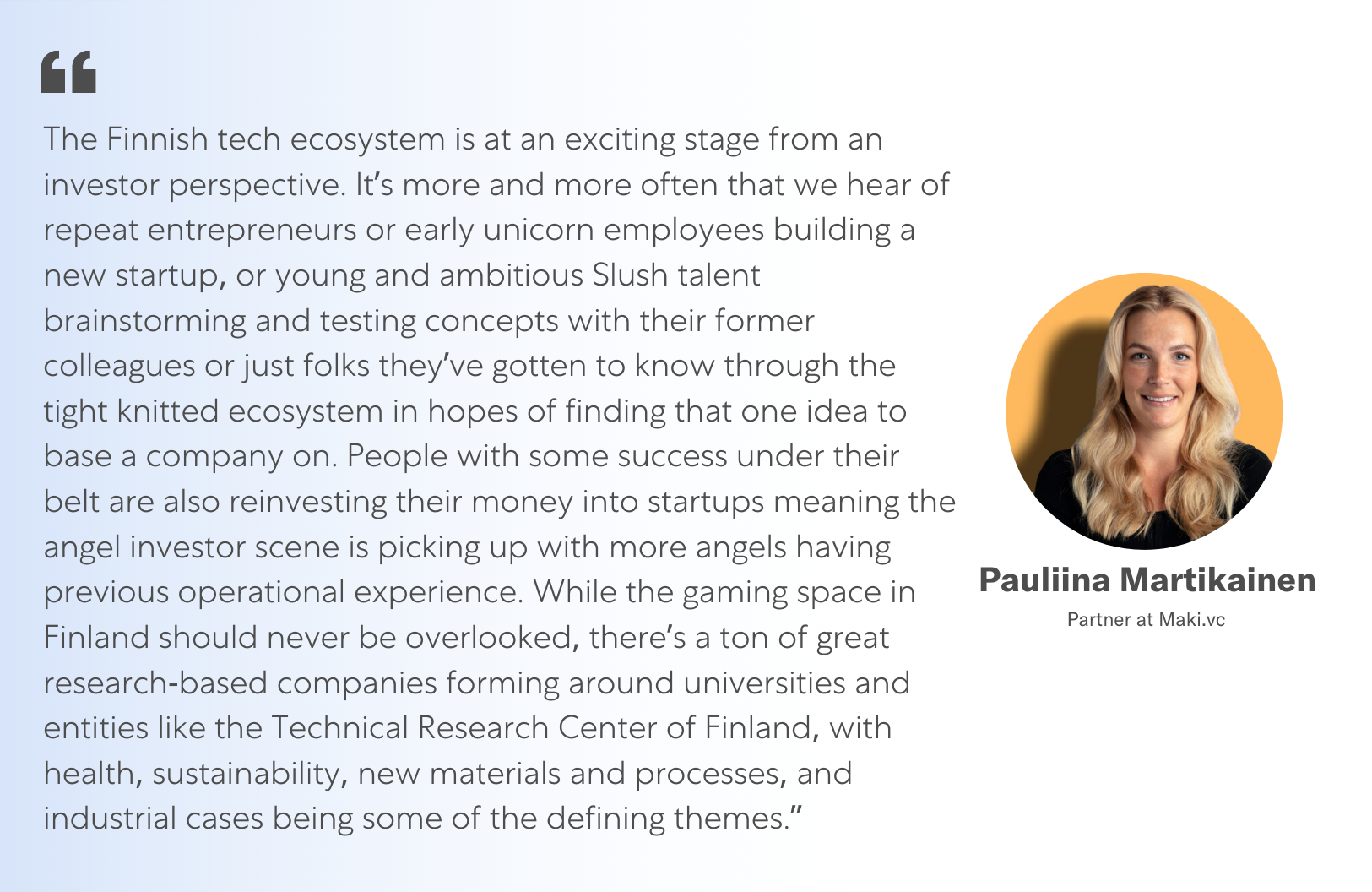
We are thrilled to be invested in this ecosystem through our investments in Flowhaven and Tesseract and continue to look for opportunities to double down in this market. Companies that have grabbed our attention include:
- Flowrite is an AI writing productivity tool that enables users to turn a set of bullets into prose. The core AI tech is based on GPT-3’s language model fine-tuned by Flowrite’s proprietary data.
- Robocorp has built a cloud platform for robotic process automation (RPA) and open-source RPA tools. The platform is built on the open-source Robot Framework project, which was originally developed as an open-source software testing environment but which the Robocorp team has applied to RPA.
Norway: The Clean-Tech Superpower
We don’t think it is unfair to say that Norway’s startup ecosystem lags behind those of its neighbours, with Norwegian companies making up a small share of Nordic VCs’ portfolios. According to the Nordic-based investors we spoke with, this is often attributed to the fact that Norway’s society and commercial structure has historically been based on commodities, such as oil, natural gas, and fisheries.
Norway also suffered from a chicken-and-egg problem. Norway’s market size means that startups need to expand internationally early on. That requires investment, but a historic dearth of growth-stage capital has limited investment and thus growth, preventing the flywheel effect from kicking off. Nevertheless, due to a combination of government initiatives, an influx of international talent and a leading position in clean tech, Norway has attracted increasing interest from international VCs in recent years, helping kickstart Norway’s ecosystem and giving rise to seven unicorns, including four in 2021 alone!
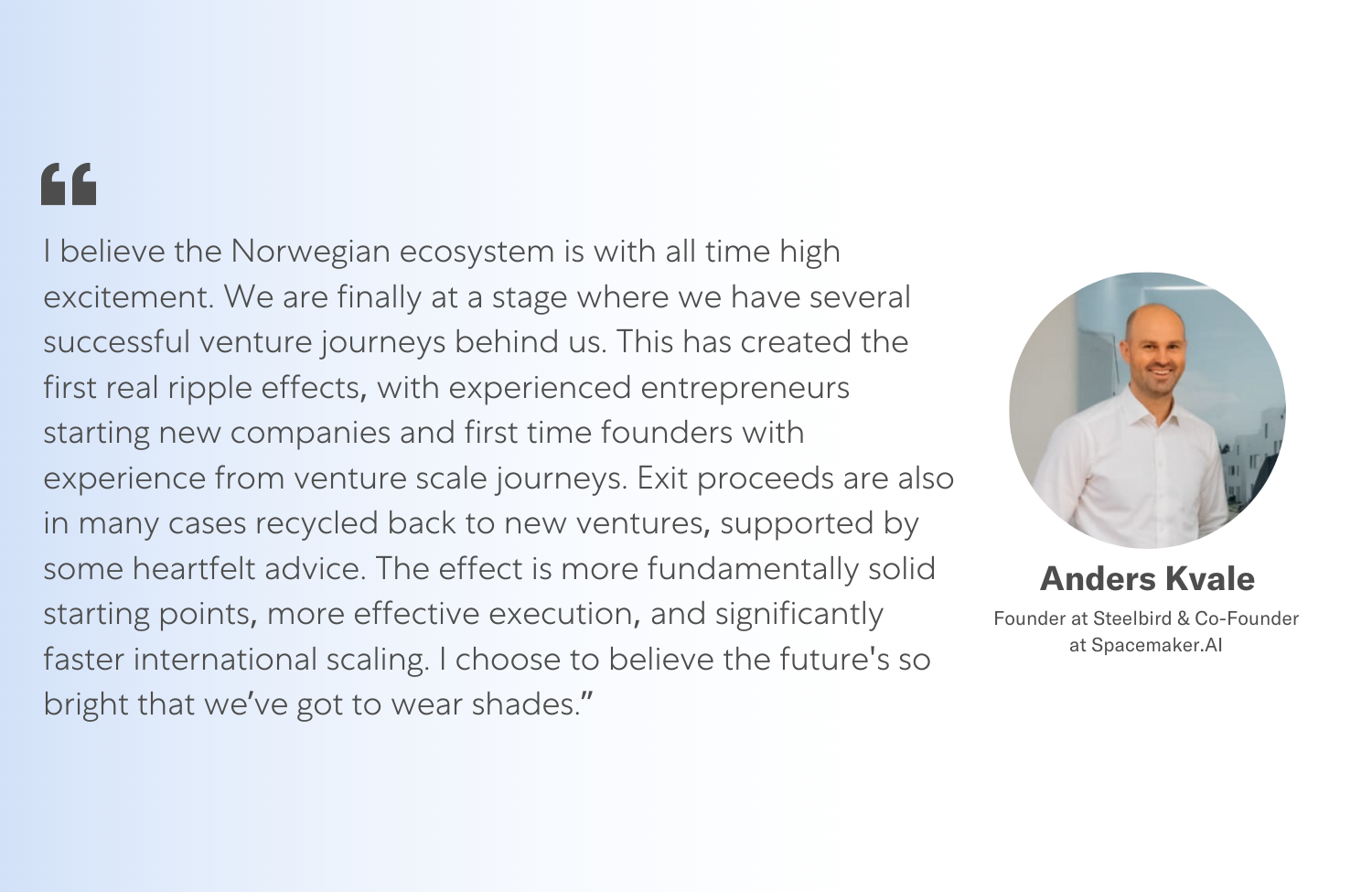
Some of the companies exciting us in Norway include:
- Dune is an Ethereum-centric analytics platform that makes on-chain crypto data accessible and consumable.
- Enode is building an API platform that enables businesses to instantly connect to users’ energy devices, such as EVs, solar power equipment, home batteries and thermostats in order to surface data and control and optimise such devices.
- Unleash has built an open-source feature flag management solution to enable developers to decouple deployment from release while keeping feature flags organised, under control and easy to use.
Iceland: The One to Watch
Last but not least we come to Iceland. Unlike most other startup ecosystems, the Icelandic startup ecosystem saw its busiest year on record in 2022. It recorded the highest number of deals and the largest amount of cumulative funding in a single year ($391 million). Unsurprisingly, the majority of Iceland’s funding comes from abroad; in 2022, 78% of total capital came from foreign investors. As a result, we believe the biggest challenge Icelandic investors and startups face is ensuring they stay connected to international startup ecosystems and markets. Drawing similarities to the Israeli ecosystem, it means that Icelandic startups tend to go global from day one.
Startups catching our eye in Iceland include:
- Grid enables users to turn spreadsheets into visual narratives by combining the power of traditional spreadsheets with text editors and presentation software. The tool also offers AI formula suggestions powered by OpenAI’s GPT-3 technology.
- Lucinity has built a modular AML platform for compliance teams made up of four core products: actor intelligence, transaction monitoring, case management and SAR management.
So What’s Next?
The Nordics are home to some of Europe’s most successful startups, and we don’t think this unicorn factory is showing any signs of slowing down. Companies building within the sustainability and impact space will play an increasingly central role in the ecosystem and while the Nordics has traditionally looked internationally for growth capital to fund its next generation of Unicorns, the rise of local VCs raising growth funds, such as Northzone, will help lower this dependency going forward. At Sapphire, we are incredibly excited by the companies of consequence being built here and are looking forward to spending more time within each country’s distinct ecosystem with the stellar investors and next generation of ambitious founders.
If you are building or investing in the Nordic startup ecosystem, we would love to get to know you. Please reach out to [email protected] and [email protected].
Special thanks to Alexander Danielsson, Anders Kvaale, Eric Lagier, Jessica Schultz, Pauliina Martikainen, and Staffan Helgesson for sharing their insights and expertise with us.
Legal disclaimer
Disclaimer: Nothing presented within this article is intended to constitute investment advice, and under no circumstances should any information provided herein be used or considered as an offer to sell or a solicitation of an offer to buy an interest in any investment fund managed by Sapphire Ventures (“Sapphire”). Information provided reflects Sapphires’ views as of a time, whereby such views are subject to change at any point and Sapphire shall not be obligated to provide notice of any change. Companies mentioned in this article are a representative sample of portfolio companies in which Sapphire has invested in which the author believes such companies fit the objective criteria stated in commentary, which do not reflect all investments made by Sapphire. A complete alphabetical list of Sapphire’s investments made by its direct growth and sports investing strategies is available here. No assumptions should be made that investments listed above were or will be profitable. Due to various risks and uncertainties, actual events, results or the actual experience may differ materially from those reflected or contemplated in these statements. Nothing contained in this article may be relied upon as a guarantee or assurance as to the future success of any particular company. Past performance is not indicative of future results.
